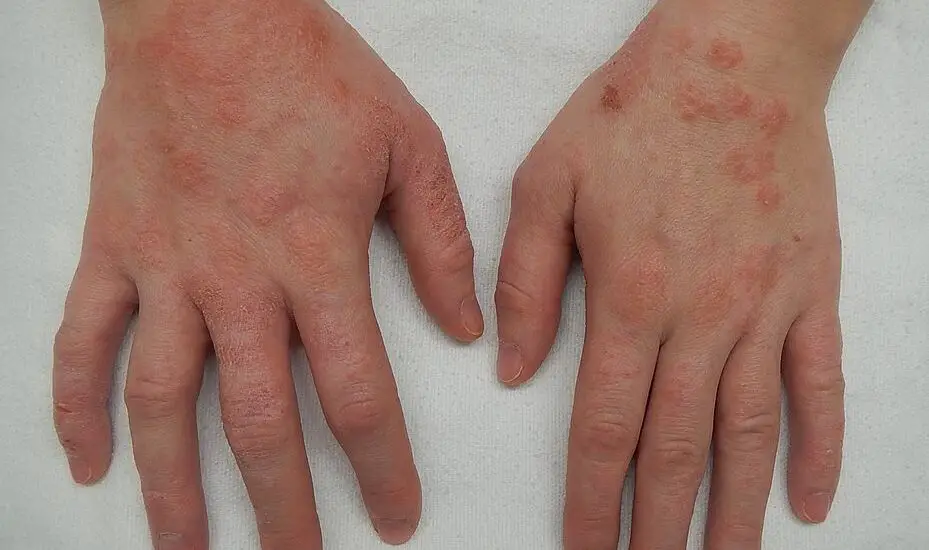If you’re worried and asking yourself, “does skin discoloration from eczema go away?,” you’re in the right spot. This comprehensive guide will give you step-by-step information on what eczema-related skin discoloration is, the factors that influence its duration, and available treatment options.

Table of Contents
Understanding Eczema and Skin Discoloration
When eczema flares up, the skin’s natural color may change, leading to what is commonly known as skin discoloration. The reason skin discoloration happens in tandem with eczema is due to inflammation.
Inflammation impacts the melanin in your skin. Melanin is the pigment responsible for the color of your skin, hair, and eyes. Eczema can either cause hypopigmentation, where the affected area becomes lighter than the surrounding skin, or hyperpigmentation, where it becomes darker.
Understanding that eczema is the root cause of the discoloration can help you better manage both conditions simultaneously.
Does Skin Discoloration from Eczema Go Away?
When it comes to eczema, the condition doesn’t just affect your skin’s texture and comfort; it can also alter its color. A burning question for many people suffering from eczema is whether this skin discoloration is permanent or not. The answer largely depends on various factors, but let’s break it down for a better understanding.
Typical Course of Skin Discoloration
In most cases, the discoloration due to eczema is not permanent. The color changes are usually a result of inflammation in the affected area. Once you manage to control the inflammation with appropriate treatment, the skin often starts returning to its normal color.
However, it’s crucial to know that the speed and completeness of this color restoration can vary from person to person.
Role of Melanocytes
Your skin color is determined by melanocytes, the cells responsible for melanin production. When the skin is inflamed due to eczema, melanocytes can either produce less melanin, causing the skin to lighten (hypopigmentation), or more melanin, making it darker (hyperpigmentation).
Once the inflammation subsides, melanocytes generally start to behave normally, and your skin should gradually return to its original color.
Length of Discoloration
How long the discoloration lasts can depend on multiple factors. For some people, the discoloration could fade in weeks, while for others, it could take months or even years in extreme cases.
Let’s break down these factors:
Severity of the Eczema: More severe eczema generally causes more significant discoloration, which may take longer to fade.
Treatment Methods Used: Effective treatment of eczema is crucial for skin discoloration to fade. For instance, topical corticosteroids can reduce inflammation and hence speed up the fading process. Ineffective treatment, on the other hand, may prolong the discoloration.
Personal Skin Care Routine: Proper skincare practices, like regular moisturizing and gentle cleansing, can support your skin’s natural healing process. Neglecting skincare can have the opposite effect.
Check out these other related articles…
White Patches on Skin After Eczema: A Complete Guide
Discoloration of Skin Due to Eczema: Comprehensive 411 Guide
Bumps on Skin From Eczema: A Comprehensive 411 Guide
Lines on Skin from Eczema: Comprehensive 411 Guide
Red Skin After Eczema: Your Complete Treatment Guide
Will Treatment Speed Up Recovery?
Effective treatment of the underlying eczema is essential for the skin discoloration to fade. Many types of treatments can be prescribed by a dermatologist for controlling eczema, ranging from topical steroids to oral medications.
The more effectively you can control the eczema, the quicker you can expect the discoloration to fade.
Exceptions and Complications
There are some exceptions where skin discoloration may take longer to fade or may be less likely to fully revert to the original color. These exceptions include severe or untreated eczema, complications from frequent scratching, or secondary bacterial infections.
In such cases, the treatment may be more complex and might involve a combination of medications and therapies.


